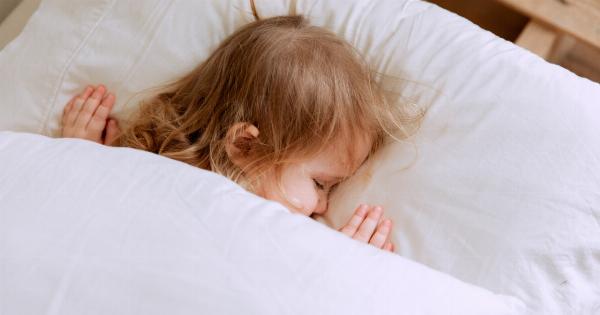Sleep is vital for children as it supports their physical, mental and emotional well-being. According to the National Sleep Foundation, children need more sleep than adults to ensure proper growth and development.
The recommended sleep guidelines vary depending on the age of the child, and parents should ensure their child gets enough quality sleep every night.
Newborns
Newborns need between 14-17 hours of sleep per day. They can sleep for 2-4 hours at a time and need to be fed frequently, resulting in erratic sleep patterns.
Infants
Infants aged 4 to 12 months require 12-16 hours of sleep per day. They might start sleeping for longer intervals during the night, but may still wake up for a feed or a diaper change.
Toddlers
Toddlers aged 1 to 2 years need 11-14 hours of sleep each day. They may transition from two naps to one afternoon nap during this period.
They might also experience sleep regressions where sleep patterns change due to factors like teething, growth spurts, or illness.
Preschoolers
Preschoolers aged 3 to 5 years require 10-13 hours of sleep per day. Most preschoolers do not nap but might need quiet time to recharge during the day. Night-time fears or separation anxiety might also affect their sleep.
School-aged children
School-aged children aged 6 to 12 years need 9-12 hours of sleep per night. They might have busy schedules with extracurricular activities, longer school days and homework that take up significant amounts of their time.
They might also have to deal with digital devices and use of technology that might affect their sleep time.
Adolescents
Teenagers aged 13 to 18 years require a minimum of 8-10 hours of sleep per night. They need more sleep during growth spurts or when faced with stressful situations.
Social pressures may also lead to late-night activities which result in shorter sleep durations, which can significantly affect their cognitive functioning, decision-making abilities, and mental health.
Recommendations for quality sleep
To ensure quality sleep, the following guidelines are recommended:.
Establish solid sleep routines and a comfortable sleep environment
Parents should establish regular sleep time routines including a pattern of bedtime stories, songs, or other calming activities before going to bed. The child’s bedroom should be quiet, dark, and cool, with a comfortable bed and bedding.
Avoid caffeine and other stimulating substances close to bedtime
Children should avoid caffeine-containing beverages such as coffee or tea and limit eating chocolate or other sugary products a few hours before bedtime. This will help prevent interrupted sleep and insomnia.
Limit screen time before going to bed
Children must stop using electronic devices, like laptops, tablets, or smartphones before going to bed. The blue light emitted by these devices suppresses the production of melatonin (sleep hormone), making it harder to fall asleep.
Encourage physical activity during the day
Physical activity can help children fall asleep faster and improve the quality of their sleep. Infants should be given enough tummy time, while toddlers and preschoolers should be encouraged to be active and spend time outside playing.
Avoid stimulating activities close to bedtime
Parents should avoid stimulating activities before bedtime, including playing games, watching action movies or having lengthy discussions. These activities can make the child too alert and restless before bed.
Develop sleep-promoting habits
Parents should teach children how to develop sleep-promoting habits such as meditation or deep breathing to help them fall asleep faster and stay asleep.
Conclusion
Children’s sleep needs vary depending on their age. Parents should help their children establish a solid sleep routine and create a comfortable sleep environment.
All stimulating substances such as caffeine, screen time, and exciting activities should be limited before bedtime. Children should be encouraged to engage in physical activity during the day. Lastly, implementing sleep-promoting habits will make the whole sleep process easier and more fulfilling for them.































